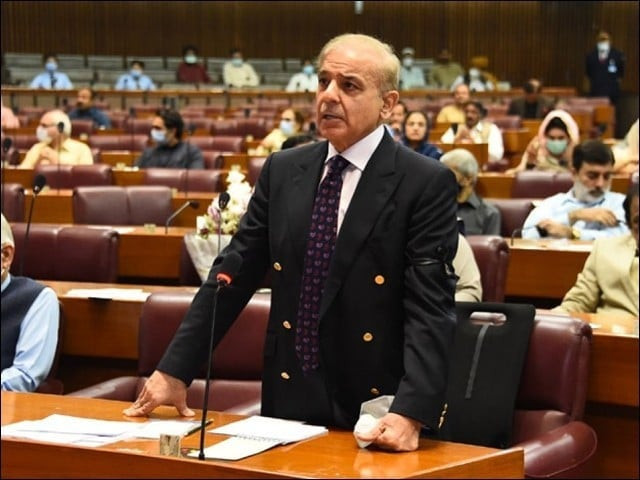Exporters fail to win tax relief from PM
Exporters demanded increase in fixed income tax rate from 1% to 1.5% instead of reverting back to normal tax regime.

Prime Minister Shehbaz Sharif on Friday did not announce a decision on exporters’ demand to withdraw the budget proposal of imposing standard 29% income tax rate–keeping his cards close to the chest as he faces competing demands for reversal of many tax proposals.
The exporters met with the PM and demanded the restoration of the 1% fixed income tax regime. In return, they proposed a little upward adjustment in their current rates.
One of the participants of the meeting also reminded the prime minister about the sufferings of the salaried class due to proposed increase in their income tax rates.
However, the Prime minister referred both the issues to Finance Minister Muhammad Aurangzeb and did not disclose his decision, at least two participants of the meeting told The Express Tribune.
In the budget, the government has proposed to end the current fixed 1% income tax rate for the exporters and to bring them in the normal income tax regime of the companies to get Rs125 billion in additional revenues.
This year the exporters paid Rs85.5 billion in 11 months and their total contributions are estimated at Rs100 billion–Rs260 billion less than the salaried class.
PM Sharif has also proposed to further increase the burden of the salaried class to force them cough up Rs75 billion more as if estimated Rs360 billion tax contributions by the salaried class in this fiscal year were not enough.
The sources said that exporters demanded that the prime minister increase the fixed income tax rate from 1% to 1.5% instead of reverting back to the normal tax regime. Pakistan’s Defense and Aviation Minister Khawaja Asif has also tweeted in favour of exporters and asked the government to keep them away from the FBR.
The exporters’ concern is about filing the income tax returns and disclosing their actual income, said Ashfaq Yousaf Tola, former chairman of the Reform and Revenue Mobilization Commission.
He said if exporters are granted this concession of fixed tax regime without filing the returns, then every taxpayer should be offered the same treatment. “Every taxpayer wants to pay a flat tax and eliminate the hassles,” said Tola.
An overwhelming majority of exporters are operating at a profit margin of 3% to 5% and there are only 20 large strategic exporters whose profits are in the range of 15%, said Dr Khurram Tariq, the president of the Faisalabad Chamber of Commerce and Industry (FCCI) while speaking during a meeting of the Senate Standing Committee on Finance on Friday.
Even if one accepts Dr Tariq’s argument about these strategic exporters, the fixed income tax rate for them should be 6% instead of 1% or 2% aimed at collecting due shares of taxes from them.
Musadaq Zulqarnain – a leading exporter and second highest income taxpayer— also met with the prime minister. His views in the meeting was that it was wrong to say that the exporters do not pay due taxes otherwise he would not have been one of the top taxpayers.
In the category of individuals, Imtiaz Stores was the highest taxpayer with Rs683 million income tax contribution and Musadaq Zulqarnain of Interloop paid Rs458 million.
In March this year, the PM announced awards for exporters. The Style Textile was Pakistan’s single largest exporter that exported $522 million in goods in the last fiscal year. This shows that even the largest exporter is not able to touch the $1 billion mark despite availing special treatments for decades.
Dr Tariq told the Senate Standing committee that the fixed regime had been introduced in 1991 on the basis of average income of exporters at that time. He said that now these income levels have increased and the government may accordingly increase the rate to 1.5% instead of abolishing the fixed regime.
The exporters are of the view that application of tax on gross realization is already a topline taxation mode and they are already bearing as a tradeoff to the calculation and payment.
They stated that conversion of this final tax to a minimum will abolish this ease and create an extra burden on the export industry as this will become a two-edged sword that an exporter has to pay on topline as well bottom line, whichever is higher.
This will put the export industry out of already existing cutthroat competition with other countries in export orders and hence will prove a recipe for disaster, said Dr Tariq.
The exporters have pleaded that it would be the height of injustice and inequality for exporters to tax them at such a highest rate of 29% along with up to 10% of super tax and also bound them to consider the tax withheld at receipt as minimum.
There are many other taxes and withholding taxes becoming a big hindrance in the way of export growth.
They are claiming that the effects of new proposals for the export industry are not rational at any point.
The 1% minimum tax at export realization is the highest taxation for most of the industry that becomes equal to 29% of the taxable income for this sector, according to the FCCI president.
An additional 1% as advance tax will become another 29% for the industry, after that super tax of up to 10%, Tax on Dividend at 15% along with other duties and taxes. This will become unworkable for the industry, said Dr Tariq



















COMMENTS
Comments are moderated and generally will be posted if they are on-topic and not abusive.
For more information, please see our Comments FAQ